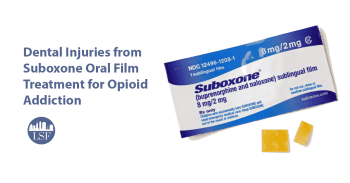Dental Injuries from Suboxone Oral Film Treatment for Opioid Addiction

Opioid addiction wreaks havoc not only on mental and physical health but it turns out that certain treatments for the condition can also cause injury to oral health. Suboxone Oral Film, a medication formulated to aid long-term recovery from opioid dependence, has been widely prescribed. Unfortunately, beneath the surface of its benefits lie potential dental side effects that demand attention. Moreover, for a period of time until 2022, Suboxone Film came without a dental injury warning. Recently, Multi multi-district litigation (MDL) was filed in the Northern District of Ohio based on the manufacturer’s failure to warn about the risk of dental injuries. The purpose of the MDL is to assist those injured but not warned about the devasting dental injuries that can be caused by Suboxone Oral Film use.
If you’ve experienced the negative impacts of Suboxone oral film treatment on your dental health, particularly the risks of tooth decay and loss, it’s important to have your case evaluated by an attorney familiar with the MDL. Lowe Scott Fisher partner Meghan Connolly is currently screening and filing cases in the Suboxone MDL. Below are some examples of the problems that arise with Suboxone Oral Film treatment.
- Dry Mouth and Reduced Salivary Flow
– The Link to Tooth Decay: Suboxone treatment can lead to dry mouth, a condition where the production of saliva is reduced. Saliva plays a crucial role in maintaining oral health by neutralizing acids, washing away debris, and preventing bacterial overgrowth. A decrease in saliva production can contribute to an environment conducive to tooth decay.
2. Tooth Decay and Erosion:
– Acidic Components in Suboxone: The acidity of Suboxone oral films may contribute to enamel erosion over time, making teeth more susceptible to decay. When coupled with the side effects above, it can be a disastrous combination.
– Cavities and Tooth Sensitivity: Individuals undergoing Suboxone treatment may experience an increased likelihood of developing cavities, accompanied by heightened tooth sensitivity.
3. Tooth Loss and Osteoporosis Concerns:
– Impact on Bone Density: Prolonged use of opioid medications, including Suboxone, may be associated with decreased bone density. This raises concerns about the potential impact on the jawbone, potentially contributing to tooth loss.
– Osteoporosis Link: Reduced bone density can lead to osteoporosis, a condition that weakens bones and increases the risk of tooth loss, particularly in the case of severe gum disease.
The risk of negative dental side effects associated with Suboxone oral film treatment are important considerations for the patient in recovery and their healthcare team. Dentists, healthcare providers, and patients must work collaboratively to mitigate these risks through proactive oral care, monitoring, and timely interventions, which can only be achieved when proper product warnings are issued. By fostering awareness and implementing strategies to preserve oral health, we can enhance the overall well-being of individuals on their path to recovery. The journey toward overcoming opioid addiction should not come with the hidden risk of dental injury.
If you believe you have experienced negative dental side effects from the use of Suboxone oral film treatments, it’s important to act while you can. Contact Lowe Scott Fisher online or by phone at 866-791-1261 for a free legal consultation. Our attorneys and staff will guide you through the process and help you determine if you have a claim.
Back To Blog